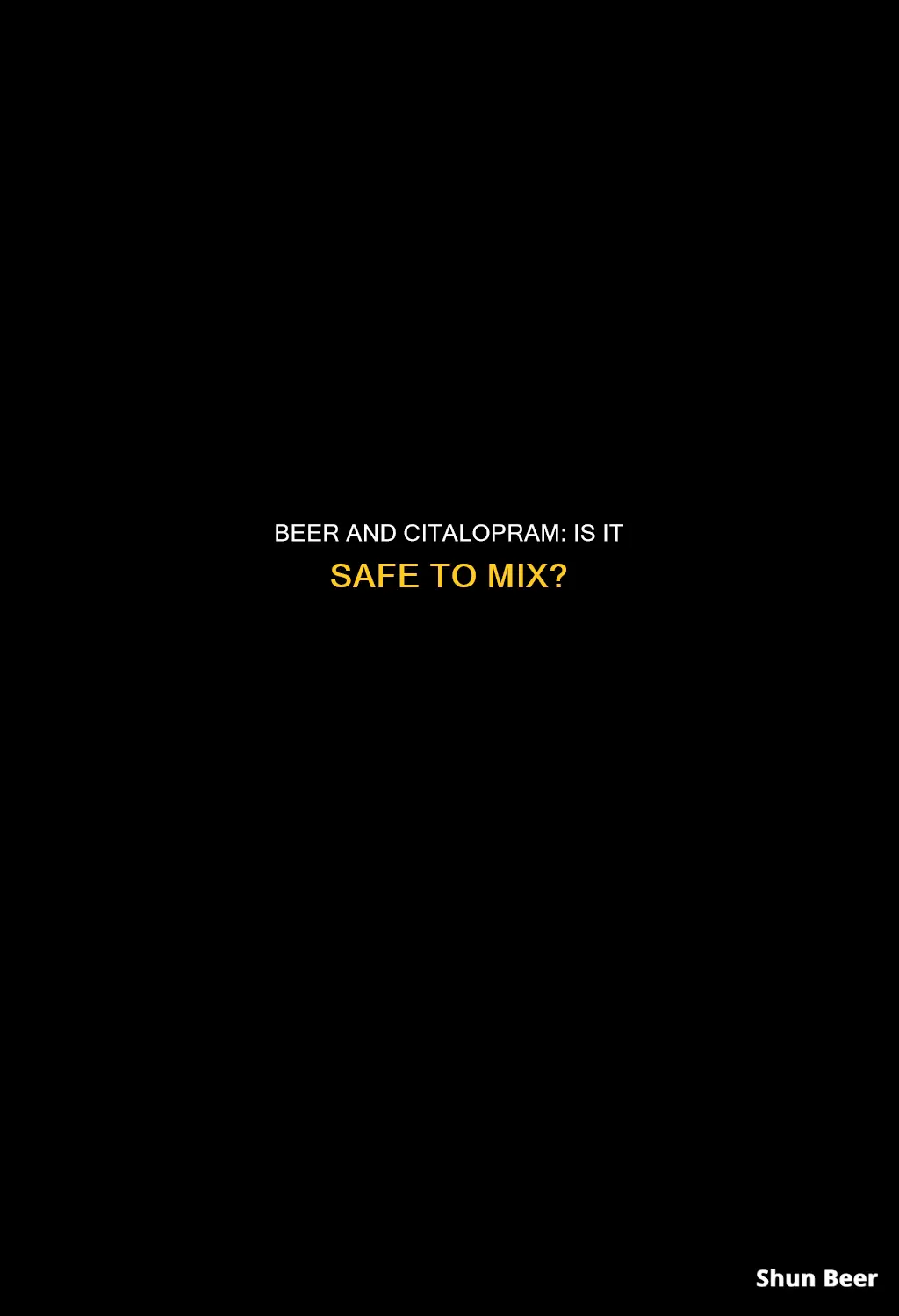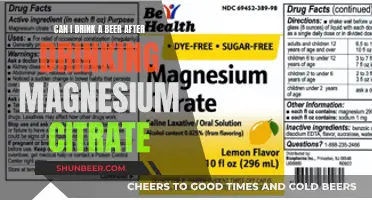
Citalopram, also known by the brand name Celexa, is a prescription drug used to treat depression and anxiety. It is part of a class of medications called selective serotonin reuptake inhibitors (SSRIs) and works by increasing serotonin levels in the brain. While it is an effective antidepressant, mixing it with alcohol is not recommended and can lead to serious side effects and health issues, including addiction and overdose.
What You'll Learn

Citalopram and alcohol can cause drowsiness and dizziness
Citalopram, also known by the brand name Celexa, is a prescription drug used to treat depression and anxiety. It belongs to a class of medications called selective serotonin reuptake inhibitors (SSRIs). While citalopram can be effective in treating these conditions, it is important to be aware of certain warnings and precautions, especially when it comes to mixing it with alcohol.
The U.S. Food and Drug Administration (FDA) explicitly warns against consuming alcohol while taking citalopram. This is because combining the two can lead to potentially serious side effects, including an increased risk of overdose, heart irregularities, and convulsions. Even when taken at the prescribed dose, mixing citalopram with alcohol can be dangerous and even deadly.
One of the main reasons to avoid mixing citalopram and alcohol is the increased risk of side effects. Alcohol can intensify the nervous system side effects of citalopram, including dizziness, drowsiness, and difficulty concentrating. This can make it dangerous to drive or operate machinery. Additionally, alcohol can impair thinking and judgment, which can further compromise your ability to make safe decisions.
Mixing citalopram and alcohol can also interfere with the effectiveness of the medication. Alcohol is a depressant, which means it can lower your mood and increase feelings of sadness and anxiety. This can counteract the intended effects of citalopram, which is to improve your mood and outlook. Drinking alcohol while taking citalopram can actually make depression worse and make the condition harder to treat.
If you are taking citalopram, it is generally recommended to avoid alcohol altogether. If you have questions or concerns about this interaction, be sure to talk to your doctor or pharmacist. They can provide personalized advice and recommendations based on your individual circumstances.
Beer and Worker Stamina: Is There a Link?
You may want to see also

The FDA warns against mixing citalopram and alcohol
The U.S. Food and Drug Administration (FDA) explicitly warns against consuming alcohol while on citalopram (Celexa). This is because mixing the two can lead to potentially serious side effects, including heart irregularities and convulsions. Citalopram is a prescription drug used to treat depression and anxiety and belongs to a class of medications called selective serotonin reuptake inhibitors (SSRIs).
SSRIs work by increasing the level of serotonin in the brain, and combining them with alcohol is not recommended. While citalopram can effectively treat depression, it’s important to be aware of the potential risks and adverse effects associated with its use. For example, a small number of children, teenagers, and young adults who have taken citalopram during clinical studies have experienced suicidal thoughts or behaviors. As alcohol is a depressant, it can worsen these feelings.
The FDA warns that any doses of citalopram (Celexa) over 40 mg per day can cause heart issues, and adding alcohol to the equation may also cause severe heart effects. The combination of alcohol and citalopram may be linked to torsades de pointes, a severe form of irregular heart rate that sometimes leads to sudden death. Therefore, it is crucial to talk to your doctor if you have a history of heart problems.
If you have taken citalopram and are wondering about safe alcohol intake, it’s best to ask your healthcare provider for their recommendations. Generally, you’ll want to wait until your body has completely cleared the drug from your system before drinking, which can take up to 24 hours. It's important to note that even if you skip your medication for the day, you could still have side effects if you drink alcohol, as citalopram builds up in your body over time.
Alcohol can also interfere with your depression treatment. As a depressant, alcohol can lower your mood and increase feelings of sadness and anxiety. Drinking may create a feel-good effect, but the feeling doesn’t last long, and you may be left feeling more depressed or anxious soon after. Alcohol also impairs your judgment, affects your motor skills, and makes you sleepy. These effects can get in the way of your ability to manage your condition and may keep you from taking positive steps toward treating your depression, such as exercising, eating right, and keeping up with checkups with your doctor.
Carmel Beach Drinking Laws: Beer and Beyond
You may want to see also

Combining the two can lead to overdose and other problems
Combining alcohol and citalopram can lead to overdose and other problems. Citalopram is a prescription drug used to treat depression and anxiety. It is an antidepressant that belongs to a class of medications called selective serotonin reuptake inhibitors (SSRIs). These work by increasing serotonin levels in the brain. Alcohol is a known depressant, which means it can lower your mood and increase feelings of sadness and anxiety. This combination can worsen feelings of depression and make it harder to treat.
The Food and Drug Administration (FDA) explicitly warns against consuming alcohol while taking citalopram. The FDA notes that while citalopram does not increase the effects of alcohol, it is still not recommended to mix the two. There are serious overdose risks when you combine citalopram and alcohol, even when taking citalopram at your prescribed dose. Symptoms of an overdose include tremors, a racing heart rate, irregular heart rate, and coma. In some cases, a citalopram overdose combined with alcohol may require the use of a ventilator to ensure the body receives enough oxygen.
Additionally, alcohol can increase the nervous system side effects of citalopram, such as dizziness, drowsiness, and difficulty concentrating. Some people may also experience impaired judgment and thinking. These side effects can be dangerous, especially if you need to drive or operate machinery. It is recommended to avoid activities requiring mental alertness until you know how the medication affects you.
Mixing alcohol and citalopram can also amplify the adverse effects of each substance. You may experience more intense side effects, such as nausea, dry mouth, sweating, sedation, insomnia, and gastrointestinal problems. There is also a risk of serotonin syndrome or serotonin toxicity, which can lead to severe symptoms, including hallucinations, rapid heartbeat, and coordination problems.
It is essential to consult with your doctor before consuming alcohol if you are taking citalopram. Your doctor may advise you to avoid alcohol altogether or recommend occasional drinking in moderation. It is crucial to follow your doctor's advice and be aware of the potential risks and adverse effects of mixing alcohol and citalopram.
Hand-Pulled Beer Pumps: Traditional, Unique, and Fun!
You may want to see also

Alcohol can worsen depression and make it harder to treat
Citalopram, also known by the brand name Celexa, is a prescription drug used to treat depression and anxiety. It belongs to a class of medications called selective serotonin reuptake inhibitors (SSRIs), which work by increasing serotonin levels in the brain. While citalopram can effectively treat depression, it's crucial to be aware of the risks associated with its use, especially when combined with alcohol.
Additionally, alcohol can worsen specific depression symptoms, including thoughts of suicide, fatigue, feelings of guilt and worthlessness, difficulty concentrating, insomnia, irritability, and persistent aches or pains. It interacts negatively with antidepressants, further exacerbating depression symptoms. The combination of alcohol and citalopram can lead to serious side effects, including heart irregularities, convulsions, and an increased risk of serotonin syndrome, a condition characterized by high serotonin levels in the body.
The effects of alcohol on depression treatment are significant. Alcohol impairs judgment, affects motor skills, and causes sleepiness, hindering your ability to manage your condition effectively. It can also interfere with your treatment plan, preventing you from taking positive steps toward recovery, such as exercising, eating healthily, and keeping up with doctor's appointments.
If you're taking citalopram or any other antidepressant, it's essential to avoid alcohol altogether. The combination can be dangerous and counterproductive to your treatment goals. Always follow your doctor's advice, and if you have any questions or concerns about alcohol consumption while on citalopram, consult your healthcare provider.
Beer and Low-Dose Naltrexone: Is It Safe?
You may want to see also

Mixing the two can cause serotonin syndrome or serotonin toxicity
Citalopram, or Celexa, is a prescription drug used to treat depression and anxiety. It belongs to a class of medications called selective serotonin reuptake inhibitors (SSRIs), which work by increasing serotonin levels in the brain. While citalopram can be effective in treating these conditions, it is important to be aware of its potential risks and adverse effects.
Mixing alcohol with citalopram can lead to serious side effects and health issues, including addiction and overdose. Alcohol can increase the nervous system side effects of citalopram, such as dizziness, drowsiness, and difficulty concentrating. It can also impair thinking and judgment, making it dangerous to drive or operate machinery. These effects can be even more pronounced when combined with citalopram, as alcohol is a depressant that can worsen feelings of sadness and anxiety.
One of the most significant risks of mixing alcohol and citalopram is the potential for serotonin syndrome or serotonin toxicity. Serotonin syndrome occurs when there is an excess of serotonin in the body, leading to severe symptoms such as hallucinations, rapid heartbeat, coordination problems, and gastrointestinal issues. This condition can be life-threatening and usually occurs when multiple medicines or supplements that increase serotonin are taken simultaneously. As citalopram is designed to increase serotonin levels in the brain, consuming alcohol with it can further increase the risk of developing serotonin syndrome.
The combination of alcohol and citalopram can also interfere with the effectiveness of the medication. Citalopram is prescribed to enhance a person's sense of well-being and energy levels, but alcohol can counteract these positive effects and make depression worse. Additionally, the side effects of other medications can be more severe when taken with citalopram and alcohol. For example, the combination may worsen the side effects of anxiety drugs, sleeping aids, and prescription pain medications.
In conclusion, it is strongly advised to avoid drinking alcohol while taking citalopram. The potential risks and adverse effects, including the danger of serotonin syndrome, far outweigh any perceived benefits. If you have any questions or concerns about your medication, it is important to consult your doctor or pharmacist.
Beer and Omeprazole: Is It Safe to Drink?
You may want to see also
Frequently asked questions
No, you should not drink beer or any other form of alcohol while taking citalopram. Mixing the two can amplify the side effects of both substances and worsen depression, making it harder to treat.
The side effects of drinking alcohol while taking citalopram can include drowsiness, dizziness, blurred vision, impaired coordination, nausea, constipation, diarrhoea, heart problems, and psychiatric issues such as suicidal ideation or mania.
If you drink alcohol while taking citalopram, the alcohol may interfere with your depression treatment. As a depressant, alcohol can lower your mood and increase feelings of sadness and anxiety. It can also impair your judgment and affect your motor skills.
If you want to drink alcohol, do not suddenly stop taking citalopram as this can cause your depression to worsen. Consult your doctor for advice and recommendations.







